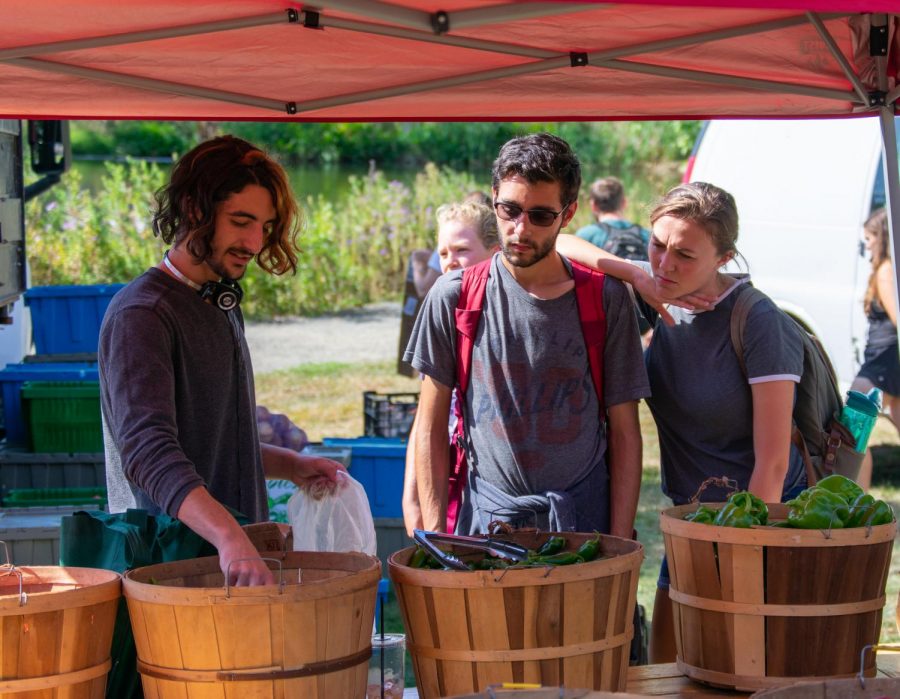The University of Massachusetts Student Farmers Market opened up for the second time this season, this time coinciding with the day’s “Walk Out for Climate” on Friday.
The market, held on the campus pond lawn (near the Integrative Learning Center), is a collaborative project between UMass Permaculture and the UMass Student Farm that has been put on since 2013 and runs from September through November. Occasionally there are markets put on in the spring.
According to Dan Bensonoff, the sustainability coordinator of Campus Gardens and organizer for the market, the market sees about 500 people attend each Friday. About 100 of the attendees come in to pick up produce through the Community Supported Agriculture subscription, he said.
Usually, the market features 10 to 20 student vendors — any student can sign up to be a vendor. The goods sold range “from students who sell their own personal art or crafts, to people who have their own beehives and bring their honey to people that want to recruit people or tell people about something that’s happening politically or an event that they’re organizing,” said Bensonoff.
He added, “It’s really more than just like the things that we’re offering. It’s about creating this movement of people who are creating alternatives to mass consumption and exploitative capitalism. That’s kind of the broader theme of what we’re trying to do is create alternative economies that are more human scale and allow people to really offer what they’re passionate about.”
Each week, the UMass Student Farm has a booth selling fresh fruit, vegetables and flower bouquets that were grown and harvested by UMass students, many of whom are majoring in sustainable food and farming.
“It’s a lot of people you can count on, they have your back … It’s also about working together during the summer because we all make decisions as one group… so you have to learn how to manage that,” said Thomas Mirabile, a sustainable food and farming major.
Though most booths only accept cash, there is an opportunity for students to pay with a card by buying tokens at the information table.
Emmalie Keenan, a graduate student studying German and Scandinavian studies, sells her embroidery at the market.
“I never imagined I would be selling art, and it’s just been a great outlet … More people are doing embroidery because they’ve met me here and seen my stuff, so that’s really fun,” she said. “The vibe here is awesome…. it’s just a lot of happy, fun people who want you to eat farm fresh food.”
Another artist, studio arts major Hannah Exum, sells stickers and posters that focus on “feminism and the idea of promoting female self-worth and the female identity.”
“It’s a really nice way to just feel integrated in your community … it’s not really as much about the selling as it is about getting to talk to talk to and get to see all different faces on campus. It’s really nice outreach,” Exum added.
Attendees can also expect to find racks of pre-owned clothing at the market by Rack City, a student-run thrift shop on campus. The clothes are donations from other students and usually range in price from one to five dollars.
“We’re always looking for more donations,” said Clara Silverstein, a junior political science major. “But all the money we make goes to the Sustainability Innovation and Engagement fund… which is called the SIE. Basically, students and faculty can apply and get funding for projects on campus.”
Bensonoff also spoke about the positive environment for vendors who get to showcase their work and receive feedback, saying “my hope [for vendors] is to talk about and showcase whatever it is that they’re offering and maybe also financially support themselves, but more importantly, kind of get that entrepreneurial experience, and be able to feel good about what they’re making … I think it’s really an affirmation for them.”
The day’s farmers market also fell at the same time as the climate strike, just steps away on the campus pond lawn.
“I think it makes sense to have those two together. Because to me… one of the best things that we can really do if we’re going to actually try to tackle the climate issue, we have to try to tackle consumerism… I think what we’re offering is an alternative way that people can engage in, with the goods that they want and support, artisans and makers without going to a big box store and getting those things,” said Bensonoff.
Irina Costache can be reached at [email protected].




















